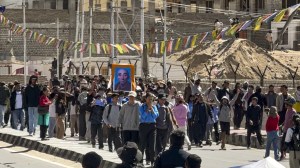E-governance: Cut red tape to achieve goal
Delivery in less time, fewer steps is the key

In its first set of recommendations since inception in June 2005, the National Knowledge Commission (NKC) has sought a radical shift in public-government interaction processes to enable real e-governance.
A group of the NKC, headed by Infosys CEO and MD Nandan Nilekani, has sought a complete step away from processes that are a hangover of the British Raj to allow the benefits of e-governance to kick in.
‘‘In our judgement, now is a unique opportunity in the history of India to leave behind the British Raj and re-engineer and modernise government processes to build a new India of the 21st century,’’ NKC chairman Sam Pitroda said while presenting the recommendations.
Current efforts at e-governance across the country were restricted to computerising the paper work process left behind by the Raj, without simplifying them, he said. The NKC in a set of 10 recommendations has firstly sought ‘government process re-engineering before any computerisation’. ‘‘The re-engineering must reduce the number of steps and the time taken for them (for obtaining a passport or a birth certificate, for example).’’
‘‘The commission has been sensitive to the fact that e-governance must not accentuate the digital divide. The information is important and irrespective of education, people should be able to access it,’’ said Nilekani.
An inter-ministerial committee was likely to look into the implementation of the recommendations within a week or two, Pitroda said. The NKC has recommended an investment of 1 to 2 per cent of the budget of programmes like the National Rural Employment Guarantee Scheme, Bharat Nirman, etc, in ‘‘establishing e-governance infrastructure to improve delivery and reduce leakages’’. The commission recommended the identification of 10 to 20 processes and services that are at present steeped in red tape and corruption to begin the e-governance re-engineering process, like ration cards, voter IDs, birth and death certificates.
Crucially, the NKC has suggested the use of open source software and standards wherever possible. ‘‘Because of the enormous size and scope of the e-governance effort and because of the availability of globally recognised software talent of Indians, we must actively encourage open source wherever possible,’’ says the commission. The NKC has also recommended ‘‘nationwide secure broadband infrastructure and associated hardware, software and hosting facilities with easy access at all levels’’.





- 01
- 02
- 03
- 04
- 05


























